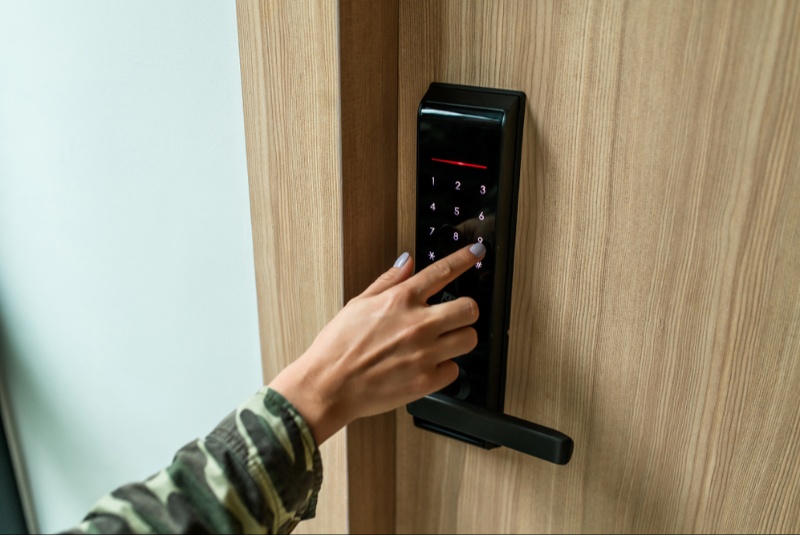In today's tech-driven world, smart locks offer unparalleled convenience, security, and peace of mind for homeowners. By integrating advanced technology into your home security system, smart locks allow you to lock and unlock your doors remotely, create temporary access codes for guests, and even receive alerts on your smartphone. However, with a myriad of options available on the market, selecting the best smart lock for your home can be a daunting task. This guide aims to simplify the process, highlighting key factors to consider, such as compatibility, security features, connectivity options, and user-friendly interfaces, to ensure you make an informed decision that enhances the safety and convenience of your home.
Compatibility and Installation
The first step in selecting a smart lock is to ensure it is compatible with your existing door hardware and home automation system. Smart locks come in various designs and may require different setups, such as replacing the entire lock mechanism or retrofitting over the existing deadbolt. It's essential to measure your door and check the specifications of the smart lock to ensure a proper fit.
Additionally, consider the compatibility with your home's technology ecosystem. If you already use smart home devices, selecting a lock that integrates seamlessly with your current system (e.g., Apple HomeKit, Google Assistant, Amazon Alexa) will enhance your overall smart home experience. This integration allows for voice commands and automations, such as locking the door automatically when your smart thermostat adjusts to "Away" mode.
Security Features
When it comes to smart locks, security is a paramount concern. Look for locks that offer robust security features to protect your home against unauthorized access. Key features to consider include encryption for data transmission, built-in alarm systems that alert you to potential break-ins, and tamper alerts that notify you if someone attempts to physically disrupt the lock.
Another essential security aspect is the type of authentication the lock uses. Options range from numeric codes and physical keys to biometric verification, such as fingerprint recognition. Choosing a lock with multiple authentication methods can provide an added layer of security, ensuring that you have alternatives in case one method fails.

Connectivity Options
Smart locks typically connect to your home network via Wi-Fi or Bluetooth. Each connectivity option has its pros and cons. Wi-Fi-connected locks allow for remote access and management from anywhere with an internet connection, making it easy to unlock your door for a guest while you're away from home. However, they may consume more power and require a stronger Wi-Fi signal near your door.
Bluetooth locks, on the other hand, use less power and offer enhanced security due to their limited range. They're ideal for locking and unlocking your door as you approach or leave your home but don't allow for remote management without an additional hub or bridge. Consider your needs and preferences to decide which connectivity option is best for you.
Ease of Use and Access Control
A smart lock should not only enhance your home's security but also its convenience. Look for a user-friendly interface that allows you to easily add, delete, or temporarily disable access codes. This feature is particularly useful for managing access for visitors, cleaners, or Airbnb guests. Additionally, consider locks that offer flexible access options, such as the ability to schedule access for certain times of the day or days of the week.
The lock's app is also an essential factor to consider. A well-designed app should provide a comprehensive overview of your lock's status, access history, and battery life. It should also offer intuitive controls for managing settings and permissions. Reading reviews of the lock's app can give you insight into user experiences and help you gauge its reliability and ease of use.
Battery Life and Power Options
Smart locks are typically powered by batteries, so it's important to consider battery life and power options. Most smart locks use standard AA batteries, which can last anywhere from a few months to a year, depending on usage and connectivity. Look for locks that offer low-battery alerts, giving you ample time to replace the batteries before they run out.
Some smart locks also feature alternative power options, such as a backup battery or the ability to temporarily power the lock with a portable battery pack. These features can be lifesavers in situations where the batteries die unexpectedly, ensuring you're never locked out of your home.
Price and Warranty
Price is a significant consideration when selecting a smart lock. While it's tempting to opt for cheaper models to save money, investing in a high-quality lock with robust security features and reliable performance can offer better value in the long run. Consider the lock's features, build quality, and compatibility with your home automation system when evaluating its price.
Additionally, check the warranty and customer support offered by the manufacturer. A good warranty can provide peace of mind, covering defects and malfunctions. Reliable customer support is also crucial for troubleshooting issues and answering any questions you may have about installation or operation.
Choosing the best smart lock for your home involves careful consideration of various factors, including compatibility, security, connectivity, ease of use, and price. By taking the time to assess your needs and research your options, you can select a smart lock that offers the perfect balance of security and convenience for your lifestyle. Remember, a smart lock is an investment in your home's security and your peace of mind. With the right smart lock, you can enjoy the benefits of modern technology while keeping your home safe and secure.


